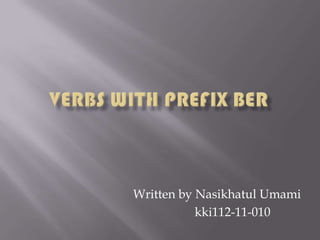
Verbs with prefix ber
- 1. Written by Nasikhatul Umami kki112-11-010
- 2. Prefix ber- is used to form verbs or adjectives from nouns or other base verbs. The resulting word typically means having or being the property or attribute that the prefix is applied to. As such, the English translation of ber- prefixed words may be classified as verbs or adjectives, depending on the context. Typically the verbs created with the ber- prefix are intransitive verbs.
- 3. When combined with a noun, the prefix ber- converts the noun to a verb, meaning to have or perform the ability or property of that noun. Examples that may translate as verbs: Apa Anda berbahasa Indonesia? (= Do you speak Indonesian?) — from bahasa (= language) Dia berpacar Yusuf (= He/She is dating Yusuf) — from pacar (= boy/girl-friend) Anjingnya berjalan ke kandang itu (= The dog is walking to the kennel) — from jalan (= way/path/road) Examples that may translate as adjectives (from nouns that are properties/conditions): Dia berbahaya (= He/She is dangerous) — from bahaya (= danger/hazard) Rambutan ini berair (= This Rambutan is succulent/juicy) — from air (= water)
- 4. When combined with a verb, the ber- prefix generates an intransitive verb (where the me- prefix or other affixes would typically create the transitive verb). Examples: From ajar (= to teach) Intransitive: belajar (= to study) Transitive: mengajarkan (= to teach) From kendara (= to ride/drive) Intransitive: Saya berkendara (= I'm driving) Transitive: Saya mengendarai mobilku (= I'm driving my car)
- 5. Example : Sedih : Kakak saya sering bersedih. (My sister often feels sad. ) gembira : Dia sedang bergembira. (She is in a happy state. ) duka : Saya ikut berduka. (My condolences.)
- 6. The prefix ber is added to : . a root noun . a root verb
- 7. If prefix added to a root noun, this will change it to a verb. Examples: Sepatu (shoes) = persepatu (wear shoes) Siul (whistle) = bersiul (to whistle) Note: In most cases these formed verbs means refelexive. In other word there is no object added after these verbs. For example bersiul. You might think that bersepatu is a verb with an object. True! But the object, shoes, is included in the verb bersepatu.
- 8. If prefix ber is added to a root verb, the verbs formed by prefix ber in most of cases are reflexive verbs. Example: Bicara (Root verb) = Berbicara (Formed verb) Henti (Root verb) = Berhenti (Formed verb)
- 9. Examples: Ajar (Root verb) = Belajar (Formed verb) Kerja (Root verb) = Bekerja (Formed verb)
- 10. Notes : When the „root word‟ begins with consonant „r‟, then „r‟ is lost or we drop one „r‟. No double „r‟ in prefix formation: Example: Rambut : Kakak saya berambut panjang racun : Tanaman itu beracun ragam : Jenis barang yang dijual beragam
- 11. The work is regularly performed or done for a living. Example : Dagang : Dia berdagang setiap hari. (He engages in trade everyday. )
- 12. Prefix ber- can be combined with a noun, adjective or a verb. The general meaning of prefix ber- is “to have” the thing represented by the noun. For example: ber + rumah = to have a house; ber+mobil = to have a car. Example : Nama = Ayah saya bernama Didi. (My father‟s name is Didi.) Debu = Mejanya berdebu. (His desk is dusty(literally „have dust„)). Kulit = Dia berkulit putih. (She has fair skin.)
- 13. Example : Kuda : Ayah saya berkuda setiap hari Minggu. (My father rides a horse every Sunday. ) topi : Lihatlah orang yang bertopi itu. (Look at that person who wears a hat. ) bapak : Dia selalu berbapak kepada saya.(He always use „bapak‟ when speaking to me)
- 14. Example : Keringat : Cuaca panas membuat saya berkeringat. (The hot weather makes me sweating. ) telur : Ayam-ayam kami sudah bertelur. (Our hens have laid eggs. ) bunyi : Pintu rumah kami selalu berbunyi kalau dibuka.(Our house door always make a sound every time we open it.)
- 15. It indicates two people stand in the same relationship to each other as specified by the base. Example: Tetangga : Ali dan Tomo bertetangga Didi. (Ali dan Tomo are neighbors. ) teman : Saya dan Susi sudah berteman lama. (Susi and I have been friends for long. ) tunangan : Toni dan Nina bertunangan kemarin. (Toni and Nina got engaged (to each other) yesterday. )